7 Mar 2014 | Americas, Ecuador, News, Politics and Society
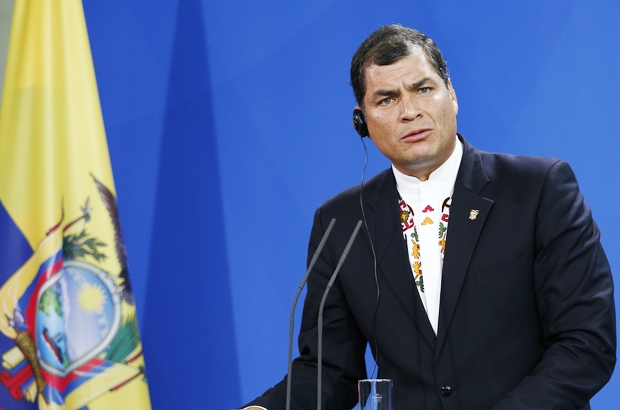
Ecuadorian president Rafael Correa (Image: Reynaldo C. Paganelli/Demotix)
President Rafael Correa’s new media law has “undercut press freedoms,” and “opens the door to censorship by giving the government or judges the power to decide if information is truthful”, according to a new report by the US State Department that ranked Ecuador as one of Latin America’s worst violators of press freedoms.
Unsurprisingly, the Correa administration hit back at the US. The Ecuadorian foreign minister, Ricardo Patiño, released a statement which claimed the report was “one sided” and came from, “a country that has a poor track record in observing human rights.”
The diplomatic tussle marked another stage in the deteriorating relationship between Quito and Washington, after Correa offered Julian Assange asylum in Ecuador in August 2012 — the Wikileaks founder still remains at the Ecuadorian embassy in London. However, the report has also highlighted the explicit crackdown on the media by Correa.
At the end of January, Correa’s government lashed out at El Universo newspaper for printing a cartoon which satirised the Boxing Day raid of opposition activist Fernando Villavicencio. Using Supercom, the media regulator established by last year’s communications law, El Universo was ordered to print a correction, and the paper was fined 2% of its average monthly sales. This recent incident marks a dangerous precedent for print media in Ecuador.
The communications law is a sweeping reform to the media landscape in Ecuador that in principle was designed to prohibit censorship, redistribute broadcast fairly and protect the rights of journalists. The reality is that the law is filled with loopholes which are open to manipulation, and allow for state interference — the creation of Supercom is a clear example of such problems.
Martin Pallares, a journalist at El Comercio, said the law, and its “subjective norms,” has led to, “tremendous self-censorship and a terrible fear among journalist.” According to Pallares, newspapers are constantly overshadowed by a fear that they will be forced out of business by a heavy fine for publishing an anti-government article. He also said the situation is more worrying because, “Correa controls the judicial system and if he wants he may order that any journalist can be prosecuted for libel.”
Reporters Without Borders has said some aspects of the communications law are positive, praising the “fairer distribution” of broadcast frequencies. But Camille Soulier, the head of Reporters Without Borders Americas desk warned the cartoon incident was the most “obvious case” of the dangers of the law which, “used in this way could foreshadow an increase in the disrespect for freedom of information.”
El Universo’s cartoon fine was not the only example of Correa intimidating partisan journalists. In September 2012, the magazine Vistazo was fined $80,000 for publishing an article which supposedly advocated a “no” vote against Correa. Then in February 2013, Ecuador’s highest held court upheld a libel conviction against El Universo that imposed a $40m fine and sentenced the three directors of the paper, and its leading columnist Emilio Palacio, to three years in jail each, for an article which accused Correa of human rights abuses. The men were later pardoned by the president, but the case still demonstrates the president’s ongoing bullying of the press.
The El Universo lawsuit had serious implications for Ecuador’s media according to the Committee to Protect Journalists’ (CPJ) Andes correspondent, John Otis. Otis said that after this lawsuit, Ecuadorian publishers and newspapers became more worried about publishing material, even if they knew that all their information is correct. “The El Universo case scares people”, Otis said, because of its potential financial implications.
Incidents such as this libel case have given rise to intense animosity from Ecuador’s media against the president. El Comercio’s Pallares has accused Correa of Orwellian control of the press. He said: “Correa does not tolerate diversity of opinions because of his deep seated religious background, and other traumas which makes him think he owns the truth. ‘You are a liar and we are the truth,’ he said to a journalist who asked him an uncomfortable question at a presentation at Columbia University some years ago.” While this depiction of Correa is evidently extreme, it is true that the president, now in his third term, set off to battle against the media from the outset.
Antoni Kapcia, a professor of Latin American History, at the University of Nottingham, views the relationship between Correa and Ecuador’s press in a more complex way however. Kapcia said that the press have been, “vehemently anti-Correa from the start,” and “they have not exactly been pursuing the lily-white truth in all these battles.” Kapcia believes that faults have been convicted on both sides of the war. “Correa is as much hitting out in retaliation as repressing the press, and in reality, he doesn’t control enough to really repress, even if he wanted to, so it’s more a case of kicking the press’s shins than really chaining it up.”
With the populist Correa, who has been in power since 2006, recently losing important local elections, the political future of Ecuador remains uncertain. One thing remains clear however, Correa’s crackdowns on Ecuador’s press are a serious threat to the democratic hopes of this Latin American nation.
This article was posted on March 7, 2014 at indexoncensorship.org
27 Feb 2014 | Egypt, Europe and Central Asia, Middle East and North Africa, News, United Kingdom
Comedian Andy Parsons and Channel 4 chief correspondent and presenter Alex Thomson were among the people gathered at Trafalgar Square today, in support of Al Jazeera journalists facing trial in Egypt on terror charges. Sue Turton, an Al Jazeera reporter who is accused of the same charge, was also present . The crowd staged a silent protest by taping their mouths shut and releasing black balloons.
The protest was part of a global day of action, where people around the world were asked to, at midday, cover their mouths, take a photo of themselves and post it online under the hashtag #FreeAJStaff.
Twenty journalists have been charged with “fabricating news and assisting or belonging to a terror cell”. Eight are in custody, including Al Jazeera’s Peter Greste, Mohamed Fadel Fahmy and Baher Mohamed. They have been imprisoned since 29 December and were last in court on 21 January, where they declared: “We are strong and we shall walk free”. The trial has been adjourned until 5 March.
Images from the protest below.
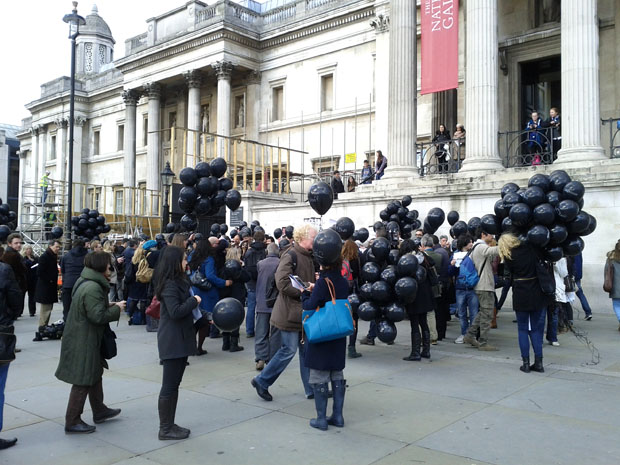
(Image: Index on Censorship)
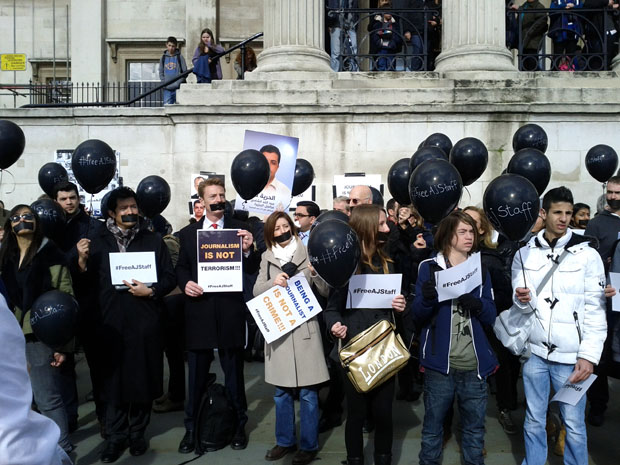
(Image: Index on Censorship)
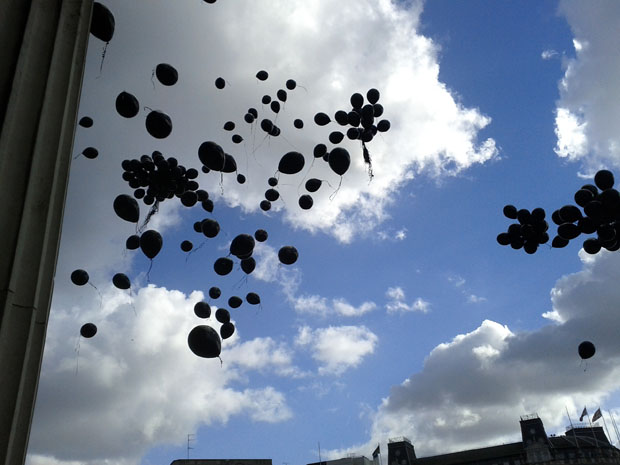
(Image: Index on Censorship)
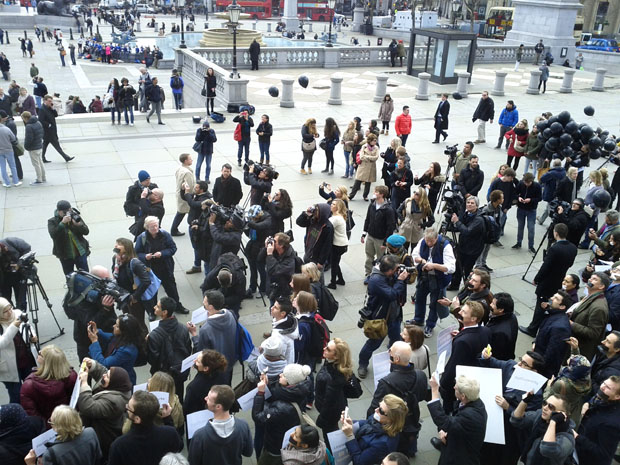
(Image: Index on Censorship)
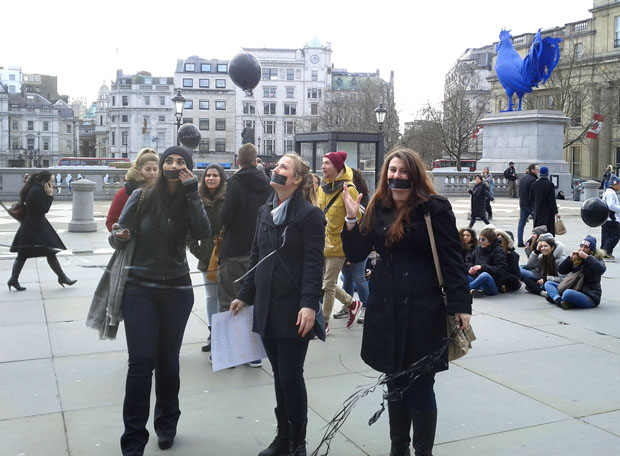
(Image: Index on Censorship)
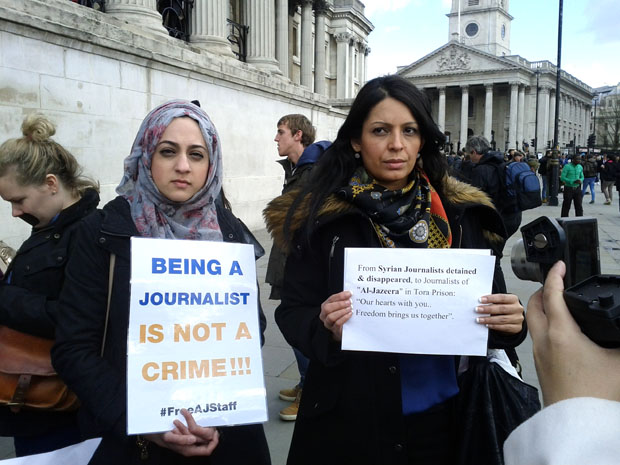
(Image: Index on Censorship)
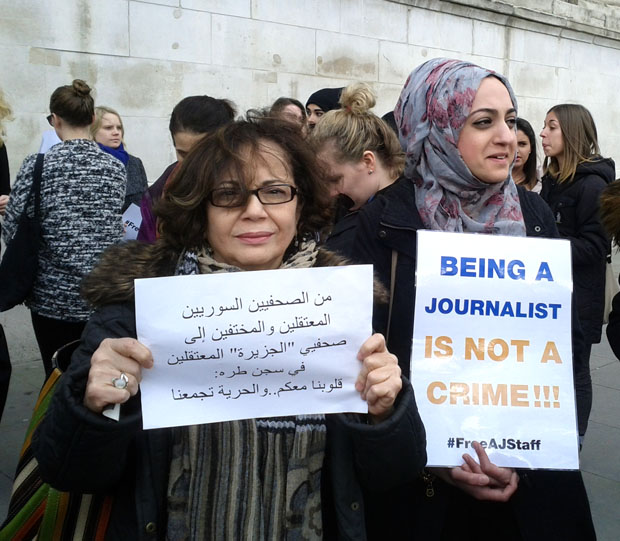
(Image: Index on Censorship)
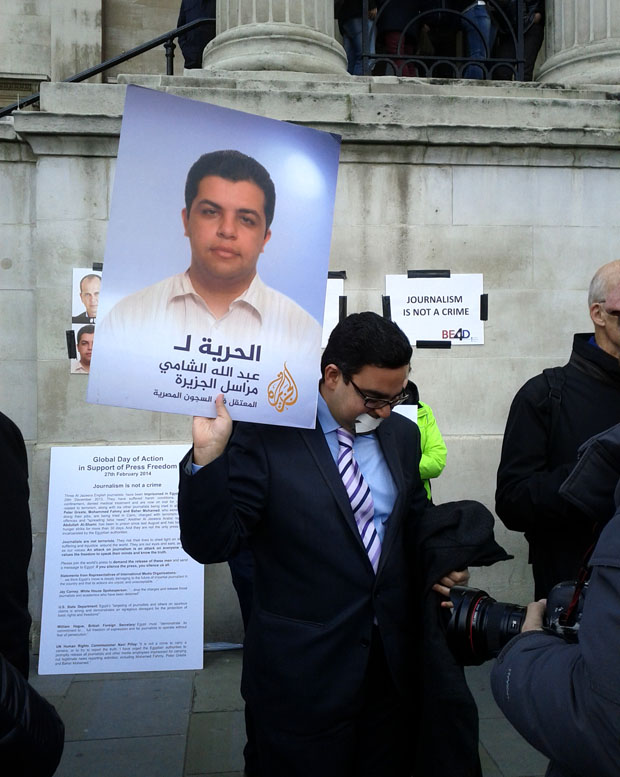
(Image: Index on Censorship)
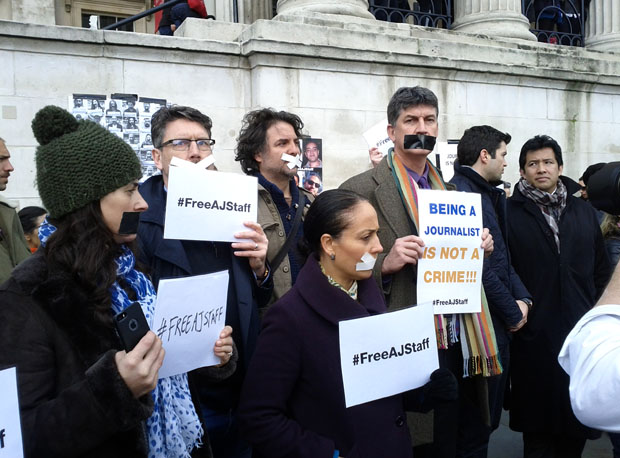
Alex Thomson (Image: Index on Censorship)
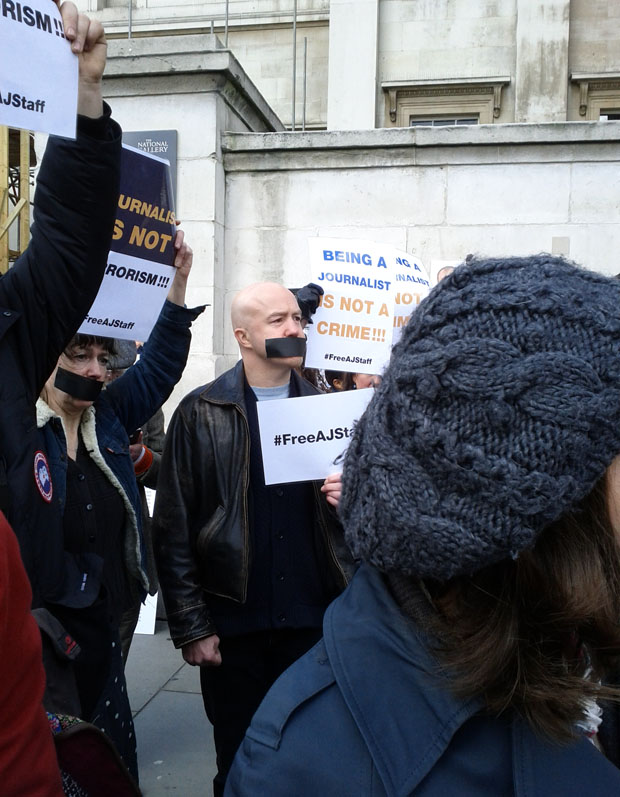
Andy Parsons (Image: Index on Censorship)
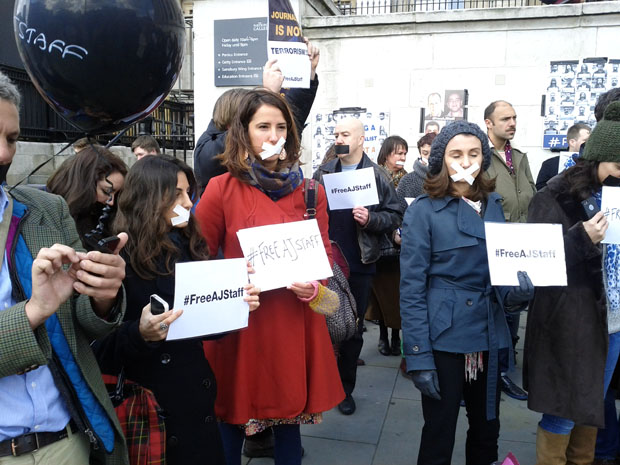
(Image: Index on Censorship)
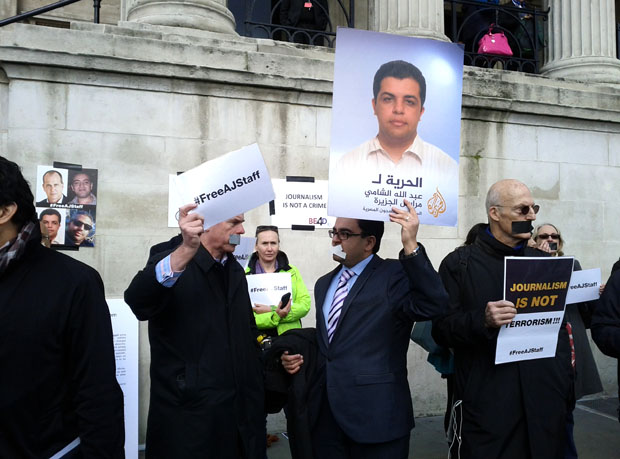
(Image: Index on Censorship)
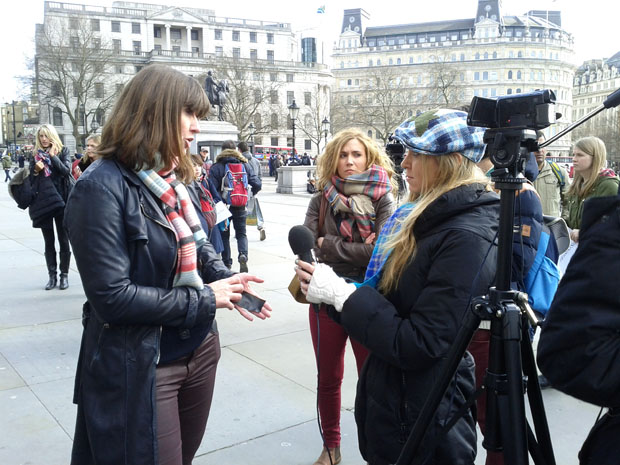
Sue Torton (Image: Index on Censorship)
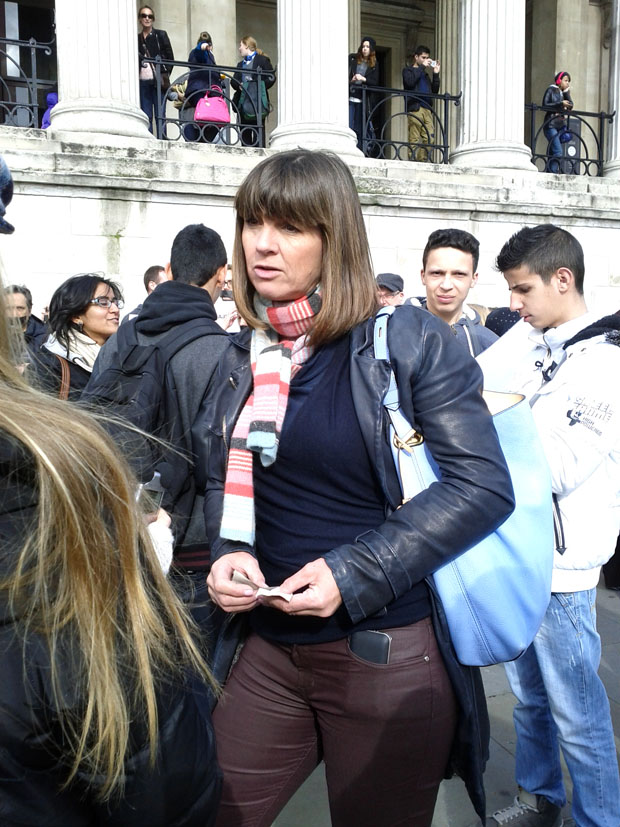
Sue Torton (Image: Index on Censorship)
This article was posted on 21 February 2014 at indexoncensorship.org
25 Feb 2014 | News, Politics and Society, Turkey
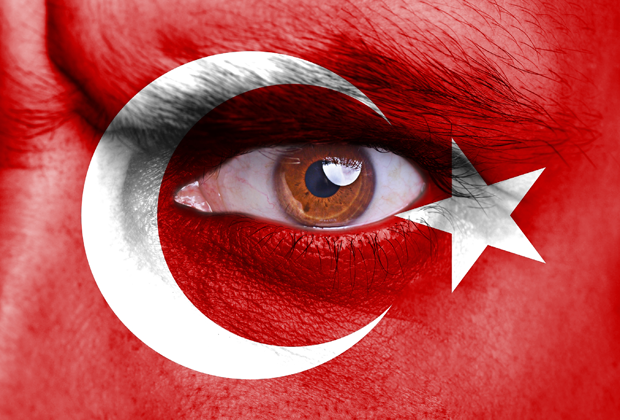
Photo illustration: Shutterstock
Turkey stands at 154 out of 180 places on Reporters Without Borders 2014 Press Freedom Index.
As of December 2013, a total of 211 journalists were behind bars somewhere in the world. Almost one fifth of these alone were jailed in Turkey, making it the country with the most number of journalists imprisoned globally, and placing it behind countries with such as Iran and China.
In the past 18 months many renowned journalists have been removed from their positions due to direct and increasing government pressure on media organisations in an attempt to control the level of critical coverage.
The height of government pressure came during the June 2013 Gezi Park protests, in which 153 journalists were injured and 39 detained for just doing their job.
The majority of mainstream national TV channels failed to cover the initial protests for fear of backlash from the government. The recent approval of a new “internet law”, a law brought in on the grounds of protecting the privacy of private information, is seen by many as the latest step in a conscious effort by the government to control freedom of expression in Turkey.
In a 2007 article, Concentration of ownership, the fall of unions and government legislation in Turkey (£) journalism professor Christen Christensen argued that the enormous power of Turkish media owners leaves journalists powerless.
Journalists’ Trade unions are seen as “useless” in, leaving reporters vulnerable to economic and political pressure. In the same article, Christensen more importantly stated that while there has been an increase in penalties for crimes committed through print or mass media, simultaneously there is a lack of provisions securing the rights of journalists to report and discuss issues. The difficulty of carrying out the profession in Turkey is enhanced by the restrictions on access and disclosure of information and the vague language used to define defamation and insult.
Today, a high number of journalists have been charged under Turkey’s anti-terrorism legislation The law’s vague wording allows a broad interpretation what constitutes support for a terrorist organisation. Many high profile journalists, such as Nedim Şener, Ahmet Şık and Cumhuriyet’s Mustafa Balbay, were charged with involvement in the “Ergenekon plot” – an alleged shadowy conspiracy that authorities claim aimed to overthrow the government. These charges have been laced with claims of falsified evidence, discrepancies in computer records and doctoring of evidence.
The grounds for arrests have similarly been a cause for confusion, Şık, for example, was arrested for allegedly supporting Ergenekon when his unpublished book was allegedly found on internet news portal OdaTV computers, while evidence against Mustafa Balbay comprised of documents seized from his home and office, which he states were notes and recorded conversations with government and military officials conducted for the purpose of his journalism.
Again, the same anti-terrorist legislation has resulted in the arrest of several Kurdish journalists for what authorities say is dissemination of propaganda aligned with the banned Kurdish Worker’s Party, or PKK, and related organisations.
As political tensions in the country increase, vague legal frameworks continue to be the enemy of not only journalists, but also other groups, most significantly students – all of whom are being taught to fear the implications of expressing their thoughts. Despite there being talks on revising the anti-terrorism legislation to narrow its scope, it is clear that the major link between the above arrests is the presence of a voice of opposition and the lack of a strong legal framework to ensure a sound judicial process.
Today, journalists such as Nedim Şener, Ahmet Şık and Mustafa Balbay, still face jail time if sentenced and it is only with a revision of the law in question and the wider legal framework relating to journalists that the profession will be able to develop and fulfil its democratic role.
This article was published on 25 February 2014 at indexoncensorship.org
24 Feb 2014 | Asia and Pacific, China, News
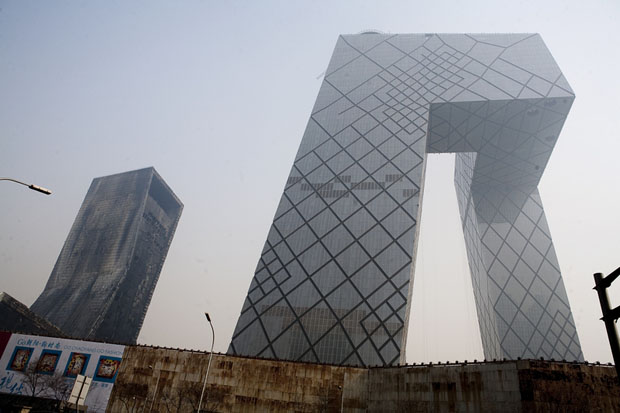
China’s state broadcaster CCTV fired a journalist for criticising its practise of airing live criminal “confessions” (Image: Matthew Niederhauser/Demotix)
In November 2013, Wang Qinglei, a TV producer at the state-broadcaster CCTV, left his office for the last time. “Long-time co-workers lamented with me, ‘Over all these years, there have been editors, reporters, producers, and directors who have been suspended because of stories, but you are the first producer who has been fired for speaking your true feelings! What is wrong with CCTV these days?'” he later wrote.
“In the space of a year, we get upwards of a thousand propaganda orders,” Wang had controversially vented on an internet forum prior to his dismissal. “We should ask ourselves: How many of these orders were issued in the national interest, and how many were issued to serve the political and economic interests of some individual, group or leader?”
His comments sparked alarm amongst the authorities. They had just passed laws forbidding citizens from exploiting the media to spread unfounded rumours and libellous claims, a strategy which most suspected was more covert censorship than genuine concern.
The open letter that he posted online, which CCTV would subsequently fire him over, focused on a new practice of airing live criminal “confessions.” State-owned CCTV had been broadcasting dramatised admissions by petty criminals for years, in an attempt to win new viewers, but in recent months, a string of high-profile political suspects had also been made to confess to crimes on air. The suspects are often filmed handcuffed and wearing jump suits. The footage is designed to be humiliating. The practice is ongoing.
Chinese-American Charles Xue, a social media celebrity and successful venture capitalist, had been amongst the first victims of the tactic, just two months previously. He “confessed” to having been “in a negative mood” while tweeting criticisms of the government, admitting that his thoughts were “a neglect of the social mainstream.” Separately, the authorities had arrested him for consorting with prostitutes, charges which some say are fabricated.
As Wang put it, when decrying the TV confessions in his open letter to CCTV executives: “We abused the public institution of media to wantonly bombard an individual indiscretion. Journalistic integrity and professionalism were nowhere to be found.”
The ironies of the circumstances surrounding Xue’s confession were either unintended or highly cynical. While the Chinese authorities are still having trouble taming the internet, the government remains in control of print and TV media.
Footage of Xue’s confession, for example, was widely discussed by Chinese TV and print outlets, whose freedom of expression is heavily limited by state involvement. Meanwhile, Xue’s online media presence was rapidly disappearing. Mentions of previous campaigns on microblogging site Weibo were removed. Wang’s open letter to CCTV, the one which had got him sacked, was also removed. Directives issued from the Ministry of Information detailed how links to any of the content would result in arrests.
Wang, and other critics of the policy, argued the on-air confessions, forced on high-profile enemies of the state such as Xue, were an unfair skip round a proper judicial process. Human rights lawyers and even some Communist Party officials have condemned the practice. The confessions sit alongside new legislation that forbids what the government call online “rumour mongering,” and allows anyone who retweets an “unfounded rumour” to be arrested. Thousands have now been arrested, including several high profile “social media celebrities.”
State newspapers say the new laws to control “rumour mongering” are necessary: “The Internet has grown into an easily accessible platform for the Chinese public, an increase in crimes such as defamation and blackmail has occurred online over the past few years.”
Indeed, authorities were quick to link Charles Xue’s arrest with those of Qin Zhihui and Yang Xiuyu – two so-called “black PR” professionals. Xue had allegedly invested in their controversial public relations outfit.
“Black PR” is a rapidly growing sector in China – which polishes the online reputation of celebrity and corporate clients – while spreading malicious rumours about their enemies. Rumours started by Qin and Yang were often fabricated, sometimes falsely accusing CEOs of infidelity, or involvements with prostitutes and causing a significant scandal when they effectively destroyed the Chinese Red Cross’ reputation, over made up allegations of sexual impropriety amongst senior officials at the organisation. The pair employed a 15,000 strong portfolio of online personalities to help spread their rumours – known as a “water army.”
Yet industrial smearing from the pair had gone unchecked for years — the government simply wasn’t interested in the malicious rumours Qin and Yang routinely disseminated. In fact, it was only when Qin and Yang’ decided to attack a senior Communist Party official, Lei Feng, that new “rumour mongering” legislation was suddenly used to arrest the pair. They now face long jail sentences.
Charles Xue, who was accused of backing the pair financially when he was arrested, has long been of interest to the party apparatus. As a young man, his father was imprisoned by Mao Zedong, and Xue was forcibly exiled to the countryside, put to work in attempt to reduce the threat he, and other academics, supposedly posed to communism. His outlook since the effective imprisonment has been increasingly international – as a young man he quickly learned English, did some translation work of American texts for publication in China, and travelled to Stanford to study.
In recent years, Xue has amassed not only vast wealth through his various business enterprises, but also several million followers on social media. He leverages this considerable audience for awareness campaigns around issues such as clean water, kidnapping and human rights. He also speaks passionately about the potential for Weibo to affect change.
The irony of the state abusing their control of TV and print to control those who “abuse” the media online has also been noted by local Chinese observers. Government bodies “spreading falsehoods” have come in for focussed criticism. Activists simply ask “why are men like Charles Xue being arrested, when the authorities regularly spread false rumours themselves?”
For example, an article about the Beijing police in a state-run newspaper, which reported on a supposed new crackdown on prostitution, was quickly identified as a fake. The article was in fact a repeat of an identical piece published several years earlier, which had simply been reprinted with a new date at the top.
Critics also called out newspaper Xinhua, when they mistakenly announced that Istanbul had been awarded the 2020 Olympic Games, instead of Japan. The authorities, who effectively operate Xinhua, were extremely embarrassed by the editorial hiccup. Yet no arrests at Xinhua have yet been made, over this Olympic-sized mistake.
International media has been suggesting Weibo is being”neutered” as a result of the new anti-rumours crackdown – with people too scared to use it. But newer analysis of online conversations since the legislation has been passed has revealed something strange. Record numbers of Chinese netizens are now politically active, in particular chatting about the relatively obscure political ideology “constitutionalism.” Constitutionalism is a reformist movement that advocates tying the Communist Party to a constitutional framework. In Weibo terms, the volume of conversations is enormous: there are currently twice as many microblogs referring to “constitutionalism” as were being made around the time of the Jade Rabbit moon landing. The Chinese foray into space held the previous record for most microblogs on a single topic, the analysis showed.
But on balance, the laws are chilling. The arrest net the “anti-rumours campaign” has thrown is big, with thousands already in custody. In politically troublesome Inner Mongolia, the state has made fifty arrests. And the firing of Wang Qinlei at CCTV will shake employees at state-owned media outlets, but also “social media celebrities” who are contemplating effecting social change online. The sacking starkly shows how the Communist Party stands behind CCTV as a broadcaster: endorsing public confessions to made-up crimes, as an agent of the state. Criticism of these public confessions will not be tolerated — instead it will be destroyed. And consider the “victim” of the confession, Charles Xue. Trumped up prostitution charges were probably difficult to explain to his wife. His kids won’t remember fondly, watching their dad on TV, confessing to being an enemy of the state. Nor the bullying that goes on in the school yard afterwards. The gossip and rumours behind his family’s back. “Saving face” is an all-important concept in China: public humiliation is the antithesis of that. Televised confessions, an unsettling and bizarre spectacle, are making even the most influential scared to speak out.
This article was posted on 21 February 2014 at indexoncensorship.org

















